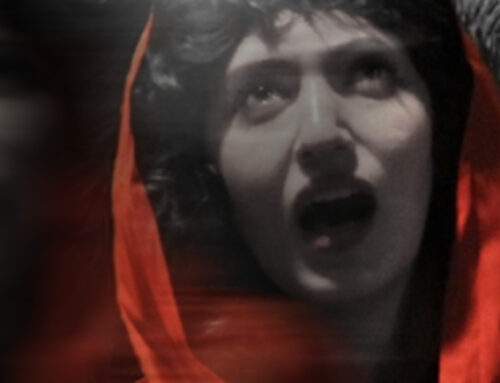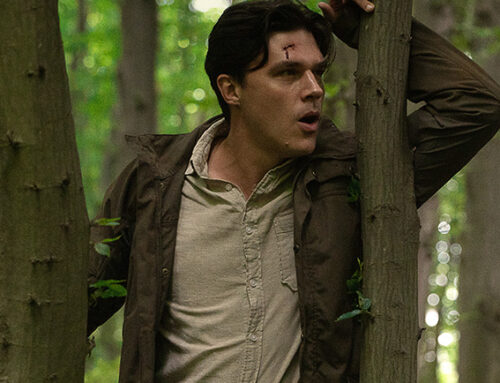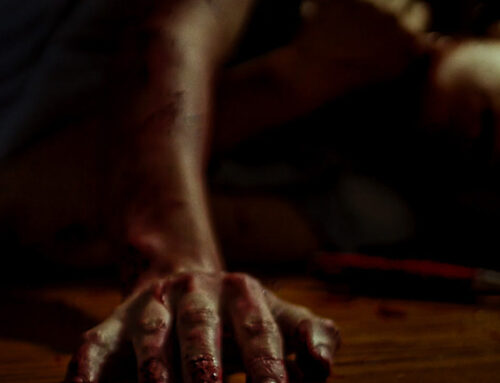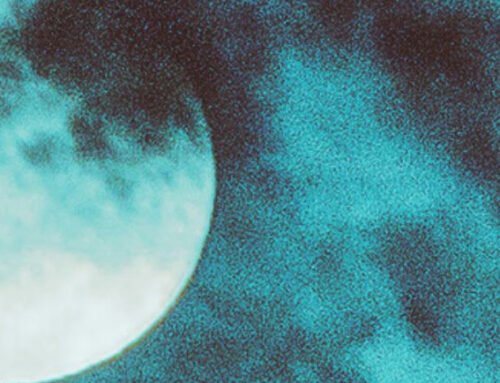Sometimes I let my curiosity get the best of me. When you do this job, the best thing you can do is to just not watch the trailer going in, but I just can’t help myself. The most you can usually hope for is to see something that looks appealing and just hope that all the good parts aren’t in the trailer. Either that or you get a preview of the ordeal you’re about to suffer through. In some rare cases, though, you see something that looks so rough, so bleak and off-kilter that it seems like it must know something that you don’t.
This is the case with Eddie Glum, written, starring, and directed by Charles Davis, a film so aggressively sparse and nihilistic that it almost challenges you to not watch it. Marketability doesn’t seem to be a primary focus for Davis, whose previous work includes a film told entirely through still images, for those who wish movies were more like Powerpoint presentations. From the opening scene, where an incredulous Eddie studies the viewer, unsure of how we got here or what we want, as he rocks in his chair to the otherworldly sounds of a dampened waterphone, we get the sense that our presence here is only being tolerated for the moment. He addresses us directly as if we are there to document his life, but while the film’s handheld aesthetic is fully embraced and the silent cameraman whose perspective the film is shot from takes an active role in fleshing out this world, our existence is left vaguely-defined and you could say the same about much of this film. Davis has made no secret of the influence David Lynch had in inspiring Eddie Glum and while I’ll stop short of comparing the two, how you feel about Lynch’s films, particularly Eraserhead, will tell you a lot about whether this will resonate with you, with the two films sharing a number of motifs and stylistic choices.
As with many of Lynch’s films, Eddie Glum operates on dream logic, with glowing-eyed zombie aliens that come out of sores on a giantess’ body, all wearing flowing cotton gowns and shower caps, that have driven humans to extinction not because they crave human meat, but because they crave cooked meat. They cook them before they eat them, that’s what they do. Chicken works as well. Also, the chickens are cats but don’t tell anybody. The viewer is encouraged to question their beliefs about Eddie and the world we find ourselves in as his character is fleshed out and we encounter the insecurities and fragilities of an increasingly disturbed man manifested as players in this surreal drama. Dreams are so enticing to artists and creators because they represent the ultimate brute force character study, bound in the ego and insulated from unconscious self-censorship and here we get the sense of a man torn down to his true nature.

The first impression we get of Eddie is one of cartoonish rigidity, as if a brick wall had been given life but couldn’t be bothered to care. Tightly-wound into a gunslinger’s stance with his shoulders pulled up to his chin and hip tilted toward the sky, Eddie approaches this new reality with a surreal sense of acceptance and relief that he is no longer subjected to the perils of interacting with humans, something we come to learn he has struggled with throughout his life. This sense of unease follows us throughout, broken up by brief intervals of joy or aggression, as he breaks from the drunken malaise of the madness he has grown to accept with a fleeting spark of lucidity. The film plays with piercing the veil between realities both by having Eddie breaking from his dream state and directly breaking the fourth wall by communicating directly to the viewer via the film’s subtitles. We’re left with a conflicted sense of who Eddie as this dejected, misunderstood soul that is nonetheless capable of a deviant lust for control and dominance. The few other characters we see reflect these flaws, with including Diane (Hope Stamper), who just comes over for food and sex but otherwise seems disgusted by Eddie and recoils at his attempts at intimacy and The Yellow Man (Hope Stamper) who threatens to enter through the front door that is always kept locked, seen stalking Eddie with his camera.
The narrative is similarly dreamlike, maintaining a brisk pace in terms of the rate at which things happen, but not possessing much in the way of linear progression, with much of the plot occurring inside of abstract vignettes that resist literal analysis and occasionally resort to cheap scares and questionable tangents, but maintain their interest through unrestrained visual and aural experimentation. The film’s grainy VHS aesthetic belies a strong sense of intent regarding light and shadow, with the contrast shifting from piercingly blown out whites to impenetrable stamp-like shadows that invert in on themselves to create a sense of a world in constant flux. The creatures invert our sense of what should be frightening by being dressed in jarring white and contrasting with the relative calm of the darkness. Eddie is at peace in his darkened solitude, and the white is used to represent the presence of life and thus of danger. The audio is fittingly unnerving well, breaking from long stretches of silence with theremins and guttural noises.
You don’t come across films like Eddie Glum often. In fact, I don’t think I’ve ever seen anything quite like it and that alone is a compelling reason to check it out. It’s not likely to grab your attention early, but if you give it time and let it get its hooks in, it’s a delightfully subversive experience that will leave you wondering how you ended up where you did by the time it’s over. If I had any complaints it would be that Eddie’s accent, which sounds very similar to Billy Bob Thornton’s character in Sling Blade, can be somewhat hokey and distracting and that certain ideas aren’t particularly well-explored, but it’s hard to fault a film about dream logic for lacking context. Definitely worth a look for Lynch fans and anyone looking for a non-traditional narrative that uses experimental cinematography to explore abstract expression.
| Eddie Glum | ||
| RATING: | UR | Eddie Glum Trailer |
| Runtime: | 1hr. 20Mins. | |
| Directed By: |
|
|
| Written By: |
|
|







